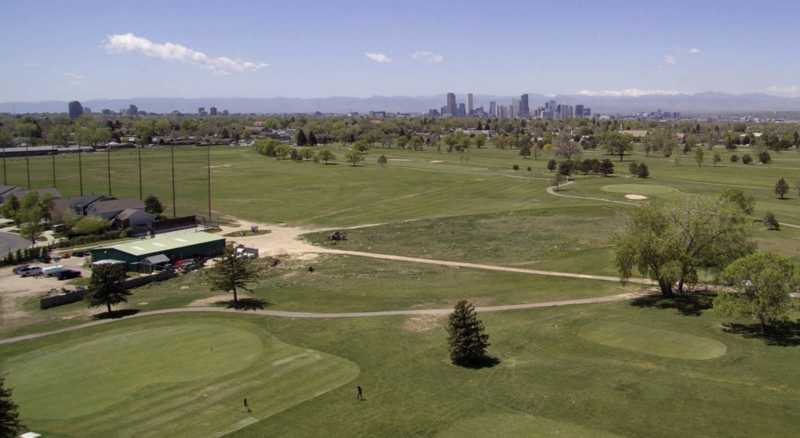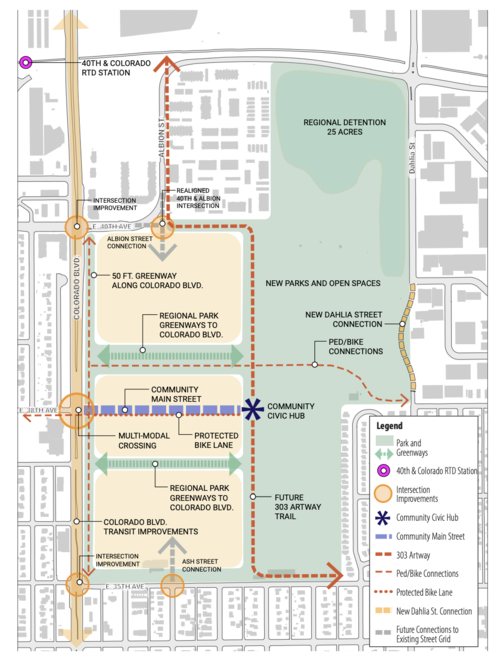Vote on Park Hill Golf Course redevelopment heads to Denver’s April ballot

Voters in Denver’s municipal elections in April will decide the fate of a controversial, years-long effort to redevelop the site of the former Park Hill Golf Course, creating a dense new residential and commercial district on the city’s northeast side while preserving most of the land as a new park.
In a series of votes on Monday night, members of the Denver City Council approved the rezoning of the area to allow for mixed-use development, along with the establishment of five municipal tax districts to fund its new infrastructure. Finally, council members voted 11-2 to refer the question of whether to lift the land’s conservation easement to Denver voters this spring.
That conservation easement requires the 155-acre parcel of land, located along Colorado Boulevard just south of Interstate 70, to be used only as a golf course. The course closed in 2018, and soon afterwards the land was sold to Westside Investment Partners, a real-estate development firm.
As early as the 1980s, the prospect of the site’s redevelopment has drawn intense opposition from some Park Hill residents. Following the sale of the land, opponents backed a successful 2021 ballot measure that required the lifting of any city conservation easement to be approved by voters.
Maria Flora, a Park Hill resident and member of Save Open Space Denver, a group opposing the redevelopment, was one of nearly 100 speakers who signed up to address City Council during a lengthy public comment period Monday night.
“Park Hill wants the Park Hill Golf Course land to remain open space. That’s clear,” Flora told council members. “From the Greater Park Hill 2019 survey, 77% of Park Hill residents … want this land to remain 100% open space. You have that survey.”
Critics of the redevelopment proposal have expressed concern about the impact that rising property values could have on homeowners in the area, and called for development to instead occur on industrial-zoned land north of the site while preserving the former golf course as open space.

The proposal from Westside Investment Partners, consistent with an area plan hashed out by local officials and community members last year, would preserve roughly 100 acres of the site as parkland and open space. A central portion of the redeveloped land along Colorado Boulevard would allow for buildings of up to 12 stories, while the majority of the new residential areas would be limited to five stories or fewer.
“From the beginning, my priorities here were preserving open space and extensive community input,” Denver Mayor Michael Hancock said in a statement on Monday’s City Council vote. “Thousands of residents came forward to share their voice, and this plan — which achieved a balance between a new large park and providing uses and services residents of this neighborhood have lacked for far too long — reflects that.”
A development agreement approved by City Council requires at least 25% of new homes and apartments built on the land to meet affordable-housing criteria. Advocates for increasing Denver’s housing supply argue that the addition of thousands of new housing units could help bring down rents and home prices across the city.
Akilah Graham, a resident who said she’d lived next to the golf course for 35 years, told council members that the area has already been impacted by soaring property values and gentrification, arguing that the need for more housing was paramount.
“My taxes are going to go up no matter what, one way or the other,” Graham said. “So I’d rather them go up while I’m helping my community live in the community and work in this community.”
“We can have both — open space, affordable housing, a grocery store,” she added. “We don’t need 155 acres of open land. I love open land — we have parks all over the place in that area. So open space is not going anywhere.”








